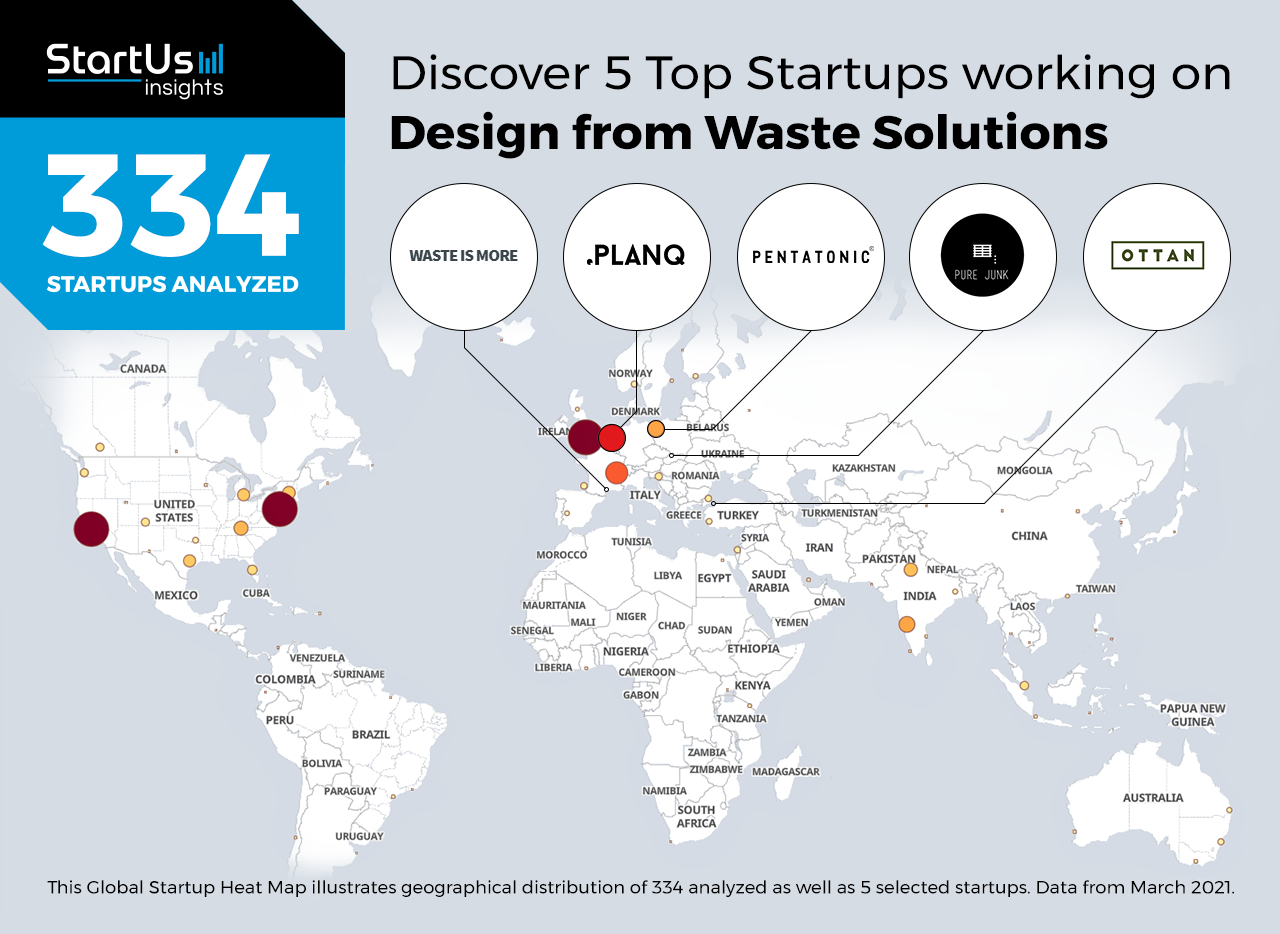Staying ahead of the technology curve means strengthening your competitive advantage. That is why we give you data-driven innovation insights into the circular economy sector. This time, you get to discover 5 hand-picked startups developing design from waste solutions.
Global Startup Heat Map highlights 5 Top Design from Waste Solutions out of 334
The insights of this data-driven analysis are derived from the Big Data & Artificial Intelligence-powered StartUs Insights Discovery Platform, covering 1.379.000+ startups & scaleups globally. The platform gives you an exhaustive overview of emerging technologies & relevant startups within a specific field in just a few clicks.
The Global Startup Heat Map below reveals the distribution of the 334 exemplary startups & scaleups we analyzed for this research. Further, it highlights 5 circular economy startups that we hand-picked based on criteria such as founding year, location, funding raised, and more. You get to explore the solutions of these 5 startups & scaleups in this report. For insights on the other 329 design from waste solutions, get in touch.
PURE JUNK specializes in Wood Waste Upcycling
Wood waste is generally burned or ends up in landfills, whereas construction companies and furniture manufacturers use fresh wood for new projects. Although not all wood waste can be upcycled or recycled due to its structure or chemical coating, secondary utilization of wood material decreases deforestation and reduces waste. To this avail, startups develop furniture design solutions from upcycled wood.
Slovak startup PURE JUNK upcycles waste materials for furniture production and interior design. The startup cooperates with waste collectors and construction companies to collect used pallets, old furniture, and wooden construction waste. PURE JUNK recovers wood materials from degradation and applies such techniques as sanding and planning to upcycle the materials into new products. The startup provides its services for individuals and businesses, focusing on creative design for the food industry.
PLANQ develops Recycled Textile Solutions
The textile production processes often produce waste due to changes in order size or design. Additionally, the frequent fashion changes and short-term trends increase the post-consumer waste of the industry. Due to the amounts of waste, as well as the considerable water usage and carbon footprint of textile production, the industry faces public pressure to lessen its impact on the environment. To help with this, startups develop textile upcycling solutions that use the material waste from production.
Dutch startup PLANQ develops design elements from recycled textile. The startup’s material, PlanqTextile, is developed by shredding textile waste into fibers and carding them into a felt material. The startup uses the material to make furniture solutions such as tabletops and cubics shelves, turning scrap textile materials into new products.
OTTAN works on Organic Waste Upcycling
Because of the increasing deforestation, there is a push for the utilization of alternative materials in construction and interior design. Accordingly, construction companies increasingly utilize hemp and bamboo as sustainable wood alternatives. As another alternative, startups explore organic waste utilization for furniture production and interior design.
Turkish startup OTTAN produces interior design elements from organic waste. The startup utilizes fruit peels, expired grains, and vegetable residues, as well as tree leaves and grass. It turns these organic items into lighting solutions, wall tiles, and furniture coating. With its organic waste upcycling solutions, OTTAN helps reduce the utilization of wood for interior design projects, as well as change people’s perception of waste.
Pentatonic accelerates Circular Economy Transformation
As waste increases, major consumer product companies seek to reduce their byproducts and adopt recycling or upcycling strategies. To help with this, startups provide research and development (R&D) services to identify upcycling opportunities and strategies. This helps companies repurpose post-consumer and out-of-use materials and optimize logistics to add another revenue stream while improving sustainability.
German startup Pentatonic speeds up the transformation to a circular economy. It partners with consumer product companies to design and develop new products from used materials such as textile and plastics, as well as from electronic waste. The startup works on new material recovery, circular systems design, and the discovery of new materials. Additionally, the startup works on its range of personal dining products, Otherware, designed from recycled CDs and food packaging and aimed at eliminating single-use plastics.
Waste Is More designs Art from Waste
Apart from aesthetics, art also acts as a medium to raise awareness about a pressing issue such as global warming or pollution. For instance, it helps attract people’s attention to over-consumerism and exacerbating waste pollution. To this end, sustainability design startups create and showcase sculptures made from waste for businesses that provide upcycling services.
French startup Waste Is More provides sustainability consulting services to companies. It designs products and art installations from waste to raise awareness about waste pollution. The startup conducts business model auditing, as well as conceptualizes and implements circular strategies. Waste Is More also develops Clip It, a constructor game that enables children to build compositions from recycled plastics.
Discover more Circular Economy Startups
Circular economy startups such as the examples highlighted in this report focus on recycled products, repurposing, and repair solutions. While all of these technologies play a major role in advancing the circular economy, they only represent the tip of the iceberg. To explore more circular economy technologies, simply get in touch to let us look into your areas of interest. For a more general overview, you can download our free Industry Innovation Reports to save your time and improve strategic decision-making.










